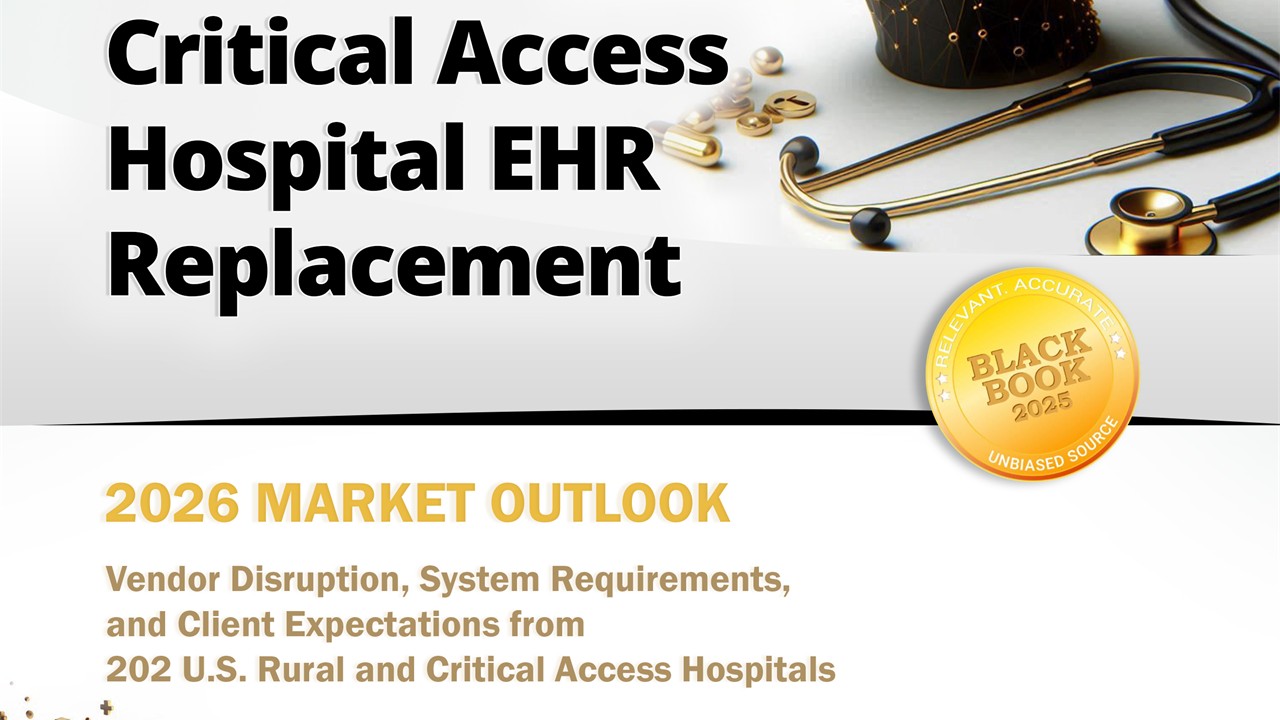Black Book Report Highlights Total Cost of Ownership and Cybersecurity Threats as Primary Factors Influencing Shift Toward Affordable, Cloud-Based EHR Solutions
TAMPA, FL / ACCESS Newswire / July 30, 2025 / Rural and Critical Access Hospitals (CAHs) across the United States are facing a notable technology transition, with 55% planning to reassess or replace their current Electronic Health Record (EHR) systems by the end of 2026. According to a comprehensive survey conducted by Black Book Research involving 202 rural hospitals across 41 states, increasing total costs associated with legacy EHR systems and escalating cybersecurity threats are among the main factors driving this strategic shift.

The survey identified significant concerns with existing EHR systems originally designed for larger, urban hospitals. The most prominent issue is the total cost of ownership, cited by 85% of respondents as unsustainable due to hidden integration fees, costly upgrades, and rising support expenses. Other major challenges include limited customization for rural workflows (78%), insufficient internal IT resources (83%), inadequate interoperability (81%), clinician dissatisfaction with usability (83%), and cybersecurity vulnerabilities (92% reported at least one cyber incident since 2021).
Cost transparency and affordability are prompting rural hospitals to adopt cloud-native, subscription-based solutions, with 86% expressing a preference for predictable pricing models. Additionally, 72% favor cloud-based platforms to reduce local IT demands and strengthen cybersecurity.
Integration of clinical and financial functionalities is another key priority. Hospitals using unified EHR and Revenue Cycle Management (RCM) systems reported an average 22% reduction in claim denial rates and a 31% improvement in billing efficiency compared to hospitals using fragmented systems.
Robust cybersecurity measures embedded within EHR systems are increasingly important, with hospitals emphasizing third-party security certifications and rapid response capabilities to counter ransomware threats.
Interoperability compliance, driven by federal initiatives such as TEFCA (Trusted Exchange Framework and Common Agreement), has also become essential, with 67% of hospitals prioritizing systems capable of seamless data exchange.
Clinician satisfaction, intuitive workflows, customizable features, and personalized customer support tailored to rural healthcare contexts are critical factors influencing vendor selection. Currently, 81% of respondents expressed dissatisfaction with generalized vendor support.
For detailed findings, trends, and additional insights, access the full report, "Rural and Critical Access Hospital EHR Replacement 2026 Market Outlook," available from Black Book Research at https://blackbookmarketresearch.com/review-free-reports
About Black Book Research
Black Book Research is an independent, unbiased healthcare technology research firm dedicated to providing comprehensive, vendor-neutral analysis. Since 2010, Black Book has maintained a strong focus on rural, critical access, and small hospital healthcare segments, conducting extensive independent surveys and analysis involving over 13,000 rural clinicians, physicians, administrators, business office staff, and board members. Its reports reflect the authentic perspectives of healthcare users across rural America, informing strategic decision-making and guiding technology investments tailored specifically to the unique challenges and needs of small and rural healthcare providers.
Contact Information
Press Office
research@blackbookmarketresearch.com
8008637590
SOURCE: Black Book Research
View the original press release on ACCESS Newswire:
https://www.accessnewswire.com/newsroom/en/healthcare-and-pharmaceutical/replacement-wave-of-rural-and-critical-access-hospital-ehr-systems-ex-1054613
